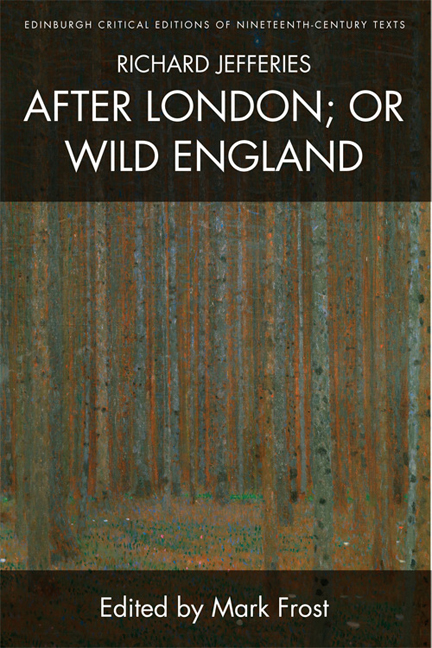Introduction
Published online by Cambridge University Press: 22 December 2017
Summary
Readers not wishing to read details of the novel in advance should treat this introduction as an afterword.
Richard Jefferies's After London; or Wild England (1885) is a novel that simply refuses to go away, and one which is gaining an ever more prominent place in studies of Victorian culture. Published during the anxious closing decades of the nineteenth century, this disturbing novel, set in a barbaric future England, can often dazzle, sometimes infuriate, and always intrigue. It begins uncannily, casually announcing the destruction of the world's greatest metropolis:
The old men say their fathers told them that soon after the fields were left to themselves a change began to be visible. It became green everywhere in the first spring, after London ended, so that all the country looked alike.
‘One of Jefferies’ masterpieces in description’, according to Edward Thomas, the opening chapters explain with ‘an unsuspected strength of remorseless logic and restraint’ the processes involved in the destruction of London and its civilisation (1978: 233). The society that suffers this cataclysmic downfall is recognisably Jefferies's, a society that ‘with certain machines worked by fire […] traversed the land swift as the swallow glides through the sky’; and capable of transmitting ‘intelligence to the utmost parts of the earth along wires’. Amidst unprecedented sea level disturbance, the Thames silts up and floodwaters enter ‘the cloacæ of the ancient city’, so that the seemingly immortal capital, symbol of British imperial reach, was found to be ‘after all only of brick, and when the ivy grew over and trees and shrubs sprang up, and, lastly, the waters underneath burst in, this huge metropolis was soon overthrown’. Using nature to destroy a city that had long fascinated and repelled him, Jefferies unsettles by invoking catastrophe; by intelligently declining to offer a clear explanation of ‘the event’ that led to London's demise; but also, and more profoundly, by refusing to provide an idyll in the tabula rasa created by the novel's opening. In his 1909 biography of Jefferies, Thomas was certainly surprised by this: ‘having described the relapse to barbarism and the loss of everything characteristic of nineteenth-century civilization, one so dogmatic and prophetic as Jefferies might have been expected to make use of this opportunity, and to show us a Utopia’ (1978: 233).
- Type
- Chapter
- Information
- Richard Jefferies, After London; or Wild England , pp. vii - xlviPublisher: Edinburgh University PressPrint publication year: 2017



